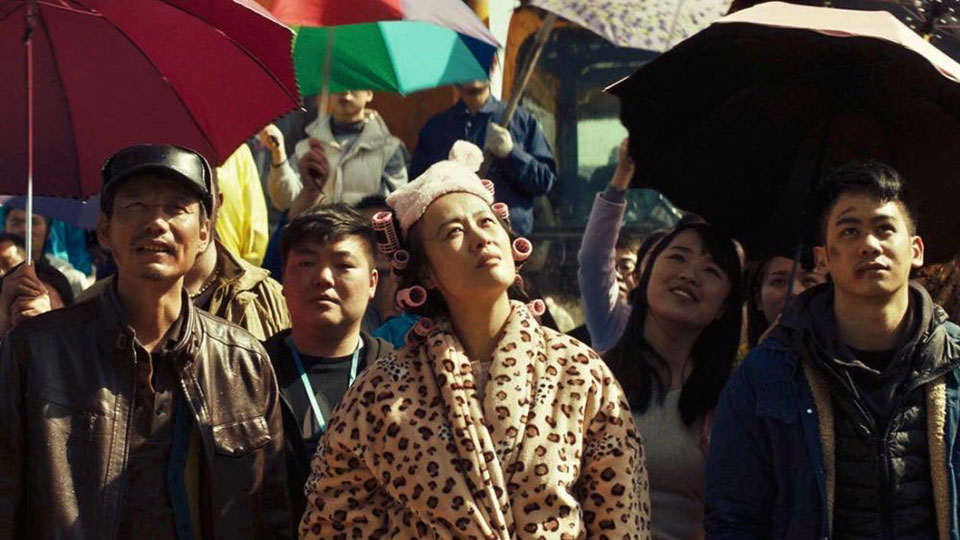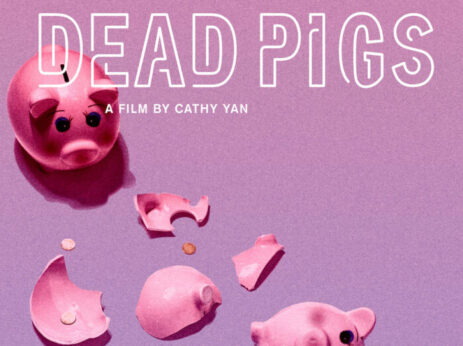
A dead pig floats mysteriously down the Huangpu River toward Shanghai. Then another and another. An armada of dead pigs cascades briskly en route to the world’s largest city, carrying disease, threatening the water supply.
Amazon has recently released director Cathy Yan’s brilliant first film Dead Pigs memorializing this bizarre epidemic. Yan’s film is smart, horrific, and apocalyptic even as it is funny, brashly colorful, and poignant. Yan has crafted an epic tale of displacement modernization.
The film conflates two familiar themes, grounded in actual current events. In March 2013, over 16,000 dead pigs clogged downstream Huangpu River, jeopardizing Shanghai’s water supply. A few years earlier, businesswoman Sun Ruoyo gained a measure of international notoriety fighting Beijing city officials who were demolishing all structures in her old hutong neighborhood in order to redevelop the area before the capital city hosted the 2008 Olympics.
“The father of my grandfather started his business here,” Sun told reporters, citing her family restaurant’s 160-year history. “This is worse than the Cultural Revolution.” Meanwhile, it was suspected that the pig farmers of Zhejiang had floated a warning to Shanghai about their own displacement.
 Yan’s story of the pains of development on one family faces off pig farmer Old Wang (Haoyu Yang) and his sister Candy (the redoubtable veteran Vivian Wu) in an existential struggle over family fortunes. Candy’s salon on the family plot is the last neighborhood building standing amid the demolished victims of modernization. She conducts her salon like a spirited self-improvement cult. Government pressure notwithstanding, Candy’s not going anywhere!
Yan’s story of the pains of development on one family faces off pig farmer Old Wang (Haoyu Yang) and his sister Candy (the redoubtable veteran Vivian Wu) in an existential struggle over family fortunes. Candy’s salon on the family plot is the last neighborhood building standing amid the demolished victims of modernization. She conducts her salon like a spirited self-improvement cult. Government pressure notwithstanding, Candy’s not going anywhere!
Old Wang wants his sister to sell the land to help pay off his gambling debts. The gangster collectors circle menacingly. Old Wang’s son Wang Zhen (played by Director Ang Lee’s real life son Mason Lee) has done no better than his father in the struggle with modernization. A sweet but impecunious dishwasher, he pretends to be a successful entrepreneur to impress his father and nightclubbing girlfriend.
Unscrupulous developers fronted by an American architect threaten these relationships when they strong-arm the installation of a grotesque faux Spanish Cathedral commercial development.
Will Candy be able to save her salon? Will Old Wang emerge unscathed from his gambling debts? Will their family be preserved? What is the ultimate price of gentrification?
This dramatic confrontation is set in cinematographer Federico Cesca’s bright, stunning visual compositions.
Special mention must also be made of Zhangke Jia, the award-winning director who served as an advisor and producer on this film. His work, along with that of his wife, actress Zhao Tao, in such films as Ash is the Purest White, 24 City, Still Life, and The World, have outlined the cost of China’s headlong plunge into an uneven future.
Zhangke Jia, as well Cathy Yan and what is known as “The Sixth Generation” of Chinese filmmakers, have shed light on the social maladies that have accompanied their nation’s economic shifts to a self-described “socialist market economy.” As they mirror economic realities, such emerging works of social realism bear watching.
Full Disclosure: The reviewer worked for many years as an Urban Planning consultant to the government of China.










